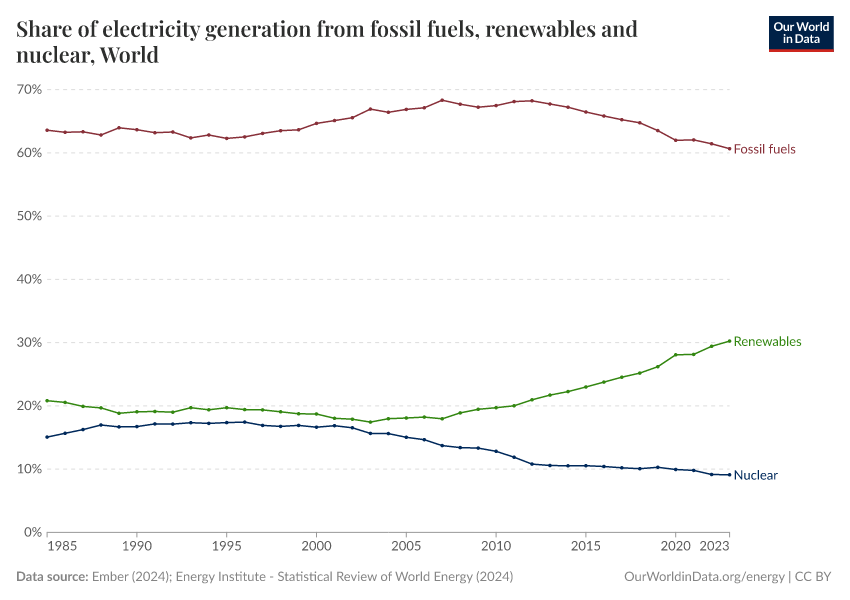Global renewables are growing, but have been partly offset by a decline in nuclear production
To effectively address global climate change, the world needs to transform its energy systems from a dependence on fossil fuels (which emit carbon dioxide and other greenhouse gases) to low-carbon energy sources.1 This process of transitioning from carbon-intensive fossil fuels to low-carbon sources is referred to as "decarbonization".
To achieve this, we have a range of low-carbon energy options. These can be defined within two main categories: renewable technologies (including hydropower, biomass, wind, solar, geothermal, and marine sources), and nuclear energy. Both of these options produce very low CO2 emissions per unit of energy compared with fossil fuels.
If we want to reduce our CO2 emissions from energy production, we have to decrease the share of energy we produce from fossil fuels and increase the share from renewables and/or nuclear energy. So how is the world actually performing when it comes to increasing its share of low-carbon technologies?
In the chart here we see trends in electricity production2 from renewable technologies, nuclear, and fossil fuels. These figures are given as the percentage contribution to total global electricity production.
We can see that since 2005, the two curves have been diverging. The share coming from renewables has gone up meanwhile nuclear has been losing its share. That means the share coming from low-carbon sources (which is renewables and nuclear combined) has not grown as much as it would have if nuclear had also increase, or even maintained a constant share. In some sense, we have partly substituted one low-carbon energy source (renewables) for another (nuclear energy).
Share of electricity production from fossil fuels and low-carbon sources
What we don't produce from renewables or nuclear is, of course, produced from fossil fuels. In the chart here we have plotted the share of electricity production from fossil fuels (coal, oil, and gas), and our combined low-carbon (nuclear plus renewables) sources. We see that despite an increase in renewable energy production, the share of electricity production from fossil fuels has now changed much.
Whilst the world is making progress in the uptake of renewable technologies, it appears our growing aversion to nuclear has been offsetting progress in decarbonising our electricity grids.
Endnotes
Energy Systems. In: Climate Change 2014: Mitigation of Climate Change. Contribution of Working Group III to the Fifth Assessment Report of the Intergovernmental Panel on Climate Change [Edenhofer, O., R. Pichs-Madruga, Y. Sokona, E.Farahani, S. Kadner, K. Seyboth, A. Adler, I. Baum, S. Brunner, P. Eickemeier, B. Kriemann, J. Savolainen, S. Schlömer, C. vonStechow, T. Zwickel and J.C. Minx (eds.)]. Cambridge University Press, Cambridge, United Kingdom and New York, NY, USA. Available online.
Note that there are several dimensions to the global energy system: transport, heat, and electricity production being the key ones. Here, we are looking only at electricity production. As the world looks to transition much of its transport sector towards electrification, decarbonisation of the global electricity mix will become increasingly important.
Cite this work
Our articles and data visualizations rely on work from many different people and organizations. When citing this article, please also cite the underlying data sources. This article can be cited as:
Hannah Ritchie (2017) - “Global renewables are growing, but have been partly offset by a decline in nuclear production” Published online at OurWorldinData.org. Retrieved from: 'https://ourworldindata.org/global-renewables-are-growing-but-are-only-managing-to-offset-a-decline-in-nuclear-production' [Online Resource]BibTeX citation
@article{owid-global-renewables-are-growing-but-are-only-managing-to-offset-a-decline-in-nuclear-production,
author = {Hannah Ritchie},
title = {Global renewables are growing, but have been partly offset by a decline in nuclear production},
journal = {Our World in Data},
year = {2017},
note = {https://ourworldindata.org/global-renewables-are-growing-but-are-only-managing-to-offset-a-decline-in-nuclear-production}
}Reuse this work freely
All visualizations, data, and code produced by Our World in Data are completely open access under the Creative Commons BY license. You have the permission to use, distribute, and reproduce these in any medium, provided the source and authors are credited.
The data produced by third parties and made available by Our World in Data is subject to the license terms from the original third-party authors. We will always indicate the original source of the data in our documentation, so you should always check the license of any such third-party data before use and redistribution.
All of our charts can be embedded in any site.

